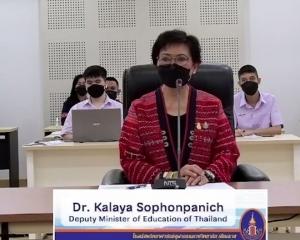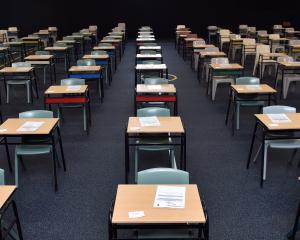Parents are now learning of the first of the twice-yearly results showing how their child is measuring compared with the standard for the relevant age group.
The policy was a feature of the National Party's election campaign in 2008, and it can fairly claim its core proposal was endorsed by a majority of the electorate.
But a very poor job indeed has been done by the Government in implementing its scheme in such a way that parents could have confidence in it from the beginning, a situation compounded by the unwarranted haste with which it has been introduced.
These failures of process have been exaggerated, even up to the very last minute, with the remark by the Minister of Education, Anne Tolley, this week that parents should bear in mind schools were still learning to work with the standards and their first reports might not be 100% correct.
That, frankly, is outrageous.
Parents are entitled to much better than this.
The minister's embarrassment and apparent anger over the publication of a Parliamentary Library research paper on national standards in primary schools becomes much more understandable when its conclusions are studied: schools may not have had time and sufficient professional development support to become familiar with the standards; pupils assessed as not achieving could lose motivation for learning, affecting their achievement; schools and teachers will need professional development assistance and support that may not be adequately provided for under the standards; the standards have been designed and implemented in a short timeframe that has not allowed a trial to determine whether they have been set at the correct level; the results may unfairly label some schools.
Even heavily discounted on a presumption of bias (which may not be justified) these conclusions, when coupled with the minister's own comments, have something of truth about them.
There can hardly be argument that national standards in core subjects are a potentially valuable measure for parents.
New Zealand's performance in literacy and mathematics as measured in young adults is so poor as to require something like aspirational standards at the earliest stages in education, and to continue them through to tertiary level.
Mrs Tolley's admission that a "bedding-in year" is needed, that schools are still learning how to work with the standards, and that measurements might not be reliable, as well as indicating the haste with which the programme has been implemented, also shows why it ought to have been properly tested in a sample of schools.
Parents should not be alarmed if their child does not meet the standard, she says, as some were set higher than normal age-group achievement.
So what will schools do in that circumstance?
Will they focus more attention on raising non-achieving pupils to meet an unreliable measurement, and at what cost to learning other subjects that are not within the scheme?
In the meantime, little John or Janet will have what for some will be the not insignificant indication of "failure" to worry about.
It is no secret that the education unions and some other interested parties have done their utmost to destabilise the scheme and to raise the opposition to it.
We have little sympathy for them; the evidence of the need for greater achievement in basic learning is unarguable.
But their negative cause has been served by Mrs Tolley's inept handling of the policy introduction, especially in Parliament where on many occasions she has simply been unable to respond in any usefully informative way about details when challenged, including such important aspects as how the moderation of the programme will work.
This is supposed to ensure consistency of assessment between teachers in schools, between schools in the same location and between locations.
To the Prime Minister's credit, he instructed his minister to tour the country speaking to meetings of parents and explaining the policy, and she has appointed an advisory group to provide assessments of its implementation.
But the crucial question is not whether there should or should not be national standards; we are well past that stage.
The problem now is that the scheme as adopted has been introduced without adequate trial on the minister's own admission, and must therefore be proved worthwhile in experimental form.
This is No 8 wire stuff.
We are surely more sophisticated in the 21st century.











